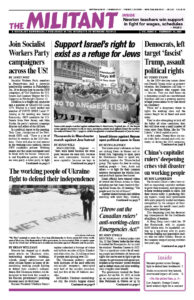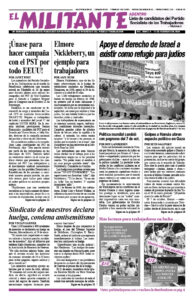February 15, 1999
DERRY, Northern Ireland — “Your demand is not about getting an apology from the British. It is not about revenge. It is about truth, about justice, about equality,” Martin Ferris, a Sinn Fein leader from Kerry, in the south of Ireland, told thousands of working people rallying in the Bogside neighborhood here at the end of the demonstration, which commemorated the 27th anniversary of Bloody Sunday — the 1972 massacre of 14 unarmed civil rights marchers by the British army.
The march was more than 15,000 strong. Uncovering the truth about these murders and winning justice for the families was a central theme of the march.
Last year the British government conceded a new inquiry into the 1972 killings, but public hearings will not begin until at least September. The British state “is not prepared to admit its part,” said relative Tony Doherty.
February 15, 1974
The you-never-had-it-so-good rhetoric of Nixon’s State of the Union message was far out of touch with reality for most working people in this country.
Nixon declared that peace and prosperity reign throughout the land, and that “Americans are living more abundantly than ever before.”
Twenty-four hours later, tens of thousands of independent truckers began a nationwide strike to defend their standard of living, which is threatened by fuel price increases and reduced speed limits.
The trade unions need to break from the straitjacket of support to the capitalist parties — the Democrats and Republicans — and begin to mobilize the masses of workers to fight for their own interests. The independent truckers, by refusing to foot the bill for the capitalist-caused fuel shortage, have set a powerful example.
February 14, 1949
[President] Truman’s claim that he has “inherent power” to outlaw and smash strikes when he decides they affect public “health, safety and welfare” is the boldest move he has yet made to arrogate to himself dictatorial powers.
By this declaration, Truman has openly attempted to assume authority that no previous president had ever dared to assert in war or peace without specific legal sanction. There is nothing in the U.S. Constitution granting the sweeping powers that Truman claims as chief executive.
Under this doctrine there is no limit to the powers the president may assert. As applied to the sphere of labor relations, Truman’s assumption of “inherent power” would make him a supreme arbiter with no legal limits to his authority to intervene against the workers at any time he decides their actions constitute a “national emergency.”

